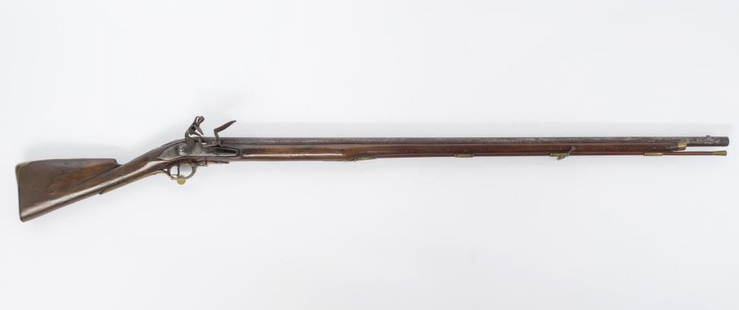
British Capture and the Burning of Washington, D.C. Newspaper Report Published Boston, A Week Later!
Similar Sale History
View More Items in Weapons & ArmorRelated Weapons & Armor
More Items in British Weapons & Armor
View MoreRecommended Collectibles
View More





Item Details
Description
War of 1812
British Capture and Burn Washington, D.C. Published Report One Week Later in "The Weekly Messenger" Boston
September 2, 1814-Dated War of 1812, Historic Reports on the British Capture and Burning of the Capitol of Washington, D.C. on Aug. 24th, Newspaper titled, "The Weekly Messenger", Boston, Massachusetts, Very Fine.
An important account on the British Capture and the Burning of Washington, D.C.. This historic September 2, 1814 War of 1812 dated Boston Newspaper measures about 13.5" x 20", 4 pages, complete. It contains scarce extensive contemporary newspaper reports with several detailed accounts of the British capture and burning of Washington, D.C. on Aug. 24th, 1814. This event, as well as the Battle of Bladensburg, which take up nearly 3 full columns on page 2. It was the important defeat of the American forces at the Battle of Bladensburg that opened the door to the British forces marching into Washington, D.C..
Also, starting on the front page and continued on page 2, a lengthy 2.5 column-long article regarding the "Exchange of Prisoners" between the U.S. and Great Britain. Expected light folds, a few small faint scattered tone spots. The defeat at the battle of Bladensburg allowed one of the most significant events of the war of 1812, where the British army was able to enter Washington, D.C. and burn the United States' most historic public buildings. Some historians have suggested the rout of the U.S. Capitol was the greatest disgrace ever dealt to American soldiers.
In the hot Summer of 1814, British troops advanced on Washington, DC. Their only obstacle was American troops guarding the heights at Bladensburg, Maryland, ten miles outside the capital. After a brief battle, the Americans took flight in their most humiliating defeat of the war, and British troops captured Washington.
On August 24, 1814, a British army arrived at Bladensburg, Maryland, intent on crossing the Anacostia River and capturing the American capital city of Washington. American troops and artillery waited on the heights overlooking the bridge the British would cross.
The Americans had the advantage, holding high ground with roughly 5,000 men opposing a smaller British force of 1,500. However, in their hurry to defend the capital, American officers had placed their men haphazardly, leaving gaps in their line. The American Commander, General William H. Winder, had only a vague sense of his troops' placement.
A single regiment of British troops bypassed the bridge and forded the river north of the crossing, threatening the Americans' left flank. Under a barrage of British rockets, the American militia fled, opening the way for the British to advance.
As their line crumbled, the American retreat became a rout. Soldiers ran for safety or rushed home to protect their families. A British naval officer noted his side had captured prisoners, but not many" the Americans had fled too quickly to be rounded up. The Americans eventually withdrew beyond the city into Virginia and Maryland. Soon after, for the first and only time, a foreign nation captured the United States capital.
Reporting to the Secretary of War, Winder chose his words carefully. "The contest," he wrote, "was not as obstinately maintained as could have been desired.
An October 7, 1814 newspaper article about the humiliating defeat described the hasty retreat as "The Bladensburg Races." By January 1815, the phrase was common enough that it became the title of a popular poem depicting the president's flight from the city.
The defeat at Bladensburg allowed the British army to enter Washington and burn public buildings, one of the most significant events of the war. Some historians have suggested the rout was the most disgrace ever dealt to American soldiers. Together, the Bladensburg Races and subsequent burning of Washington marked the lowest point of the war for the young American military.
British Capture and Burn Washington, D.C. Published Report One Week Later in "The Weekly Messenger" Boston
September 2, 1814-Dated War of 1812, Historic Reports on the British Capture and Burning of the Capitol of Washington, D.C. on Aug. 24th, Newspaper titled, "The Weekly Messenger", Boston, Massachusetts, Very Fine.
An important account on the British Capture and the Burning of Washington, D.C.. This historic September 2, 1814 War of 1812 dated Boston Newspaper measures about 13.5" x 20", 4 pages, complete. It contains scarce extensive contemporary newspaper reports with several detailed accounts of the British capture and burning of Washington, D.C. on Aug. 24th, 1814. This event, as well as the Battle of Bladensburg, which take up nearly 3 full columns on page 2. It was the important defeat of the American forces at the Battle of Bladensburg that opened the door to the British forces marching into Washington, D.C..
Also, starting on the front page and continued on page 2, a lengthy 2.5 column-long article regarding the "Exchange of Prisoners" between the U.S. and Great Britain. Expected light folds, a few small faint scattered tone spots. The defeat at the battle of Bladensburg allowed one of the most significant events of the war of 1812, where the British army was able to enter Washington, D.C. and burn the United States' most historic public buildings. Some historians have suggested the rout of the U.S. Capitol was the greatest disgrace ever dealt to American soldiers.
In the hot Summer of 1814, British troops advanced on Washington, DC. Their only obstacle was American troops guarding the heights at Bladensburg, Maryland, ten miles outside the capital. After a brief battle, the Americans took flight in their most humiliating defeat of the war, and British troops captured Washington.
On August 24, 1814, a British army arrived at Bladensburg, Maryland, intent on crossing the Anacostia River and capturing the American capital city of Washington. American troops and artillery waited on the heights overlooking the bridge the British would cross.
The Americans had the advantage, holding high ground with roughly 5,000 men opposing a smaller British force of 1,500. However, in their hurry to defend the capital, American officers had placed their men haphazardly, leaving gaps in their line. The American Commander, General William H. Winder, had only a vague sense of his troops' placement.
A single regiment of British troops bypassed the bridge and forded the river north of the crossing, threatening the Americans' left flank. Under a barrage of British rockets, the American militia fled, opening the way for the British to advance.
As their line crumbled, the American retreat became a rout. Soldiers ran for safety or rushed home to protect their families. A British naval officer noted his side had captured prisoners, but not many" the Americans had fled too quickly to be rounded up. The Americans eventually withdrew beyond the city into Virginia and Maryland. Soon after, for the first and only time, a foreign nation captured the United States capital.
Reporting to the Secretary of War, Winder chose his words carefully. "The contest," he wrote, "was not as obstinately maintained as could have been desired.
An October 7, 1814 newspaper article about the humiliating defeat described the hasty retreat as "The Bladensburg Races." By January 1815, the phrase was common enough that it became the title of a popular poem depicting the president's flight from the city.
The defeat at Bladensburg allowed the British army to enter Washington and burn public buildings, one of the most significant events of the war. Some historians have suggested the rout was the most disgrace ever dealt to American soldiers. Together, the Bladensburg Races and subsequent burning of Washington marked the lowest point of the war for the young American military.
Buyer's Premium
- 30%
British Capture and the Burning of Washington, D.C. Newspaper Report Published Boston, A Week Later!
Estimate $300 - $400
2 bidders are watching this item.
Shipping & Pickup Options
Item located in Rancho Santa Fe, CA, usOffers In-House Shipping
Payment
Accepts seamless payments through LiveAuctioneers

TOP



























































![Captured Bowie Knife w/ Period Note of Provenance: Captured Confederate D-hilt Bowie knife. [Kenansville, North Carolina]: [Louis Froelich factory]. With original metal and leather sheath with affixed period notes. First note with only remnants. Secon](https://p1.liveauctioneers.com/7226/325455/175169154_1_x.jpg?height=310&quality=70&version=1712370394)

![[Civil War] Bullet Which Nearly Killed Soldier: Lead bullet encased in gold acorn fob with chain. Finely engraved: "W.D. Fiske / 14th Regt. C V / Fredericksburg / Dec 17, 1863." Acorn approx. 1 1/2 x 1 in. Overall length 6 1/2 in. Published in "Her](https://p1.liveauctioneers.com/7226/325455/175169103_1_x.jpg?height=310&quality=70&version=1712370394)




![Historic Einstein Signed Program from Lincoln University Visit: Conferences on Objectives. Lincoln University, [Oxford], Pennsylvania, 3 May 1946. SIGNED BY ALBERT EINSTEIN. Tipped into Horace Mann Bond (1904-1972). The Education of the Negro in the American Socia](https://p1.liveauctioneers.com/7226/322253/173251693_1_x.jpg?height=310&quality=70&version=1710004847)
